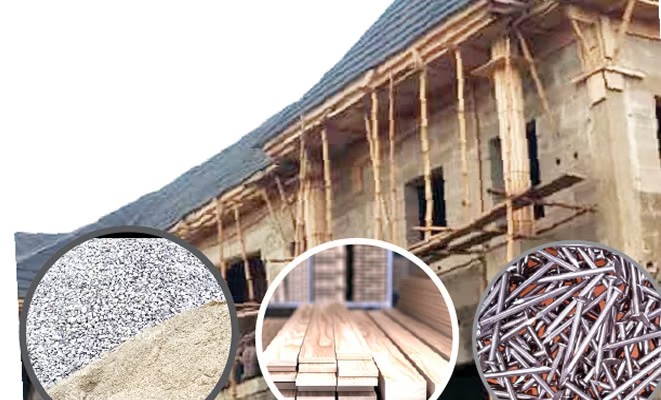The costs of steel, tiles, doors, and Plaster of Paris (PoP) cement, among others, have risen by over 20% between March 2021 and August 2021. This is according to a survey of major building materials markets across Lagos.
For instance, the cost of steel, which was sold at N360,000 per tonne as of March 2021, had increased to N441,000 at the end of August 2021, representing a 22.5% increase within the period under review.
The cost of super white cement increased from N3,200 (25kg) to N8,000 and N9,000, and the cost of high-quality white cement (40kg) also increased from N6,500 to N16,000.
The cost of 8mm diameter and 25mm diameter (imported) steel increased from N330,000 and N380,000 to N380,000 and N420,000 respectively.
Doors are not left out in the hike. The cost of Flush door (high quality), Panel door and Turkish steel door (1,500 x 2,100) also rose from N60,000, N75,000, N235,000 to N85,000, N115,000 and N350,000 (or N400,000 depending on the brand) respectively.
The hike also affected other building materials like cement blocks, binding wires and roofing sheets. Cement block (6 inches) are up from N180 to N230; 9 inches blocks are up from N210 to N280. The cost of binding wires and roofing sheets also rose from N8,000 and N6,500 per square metre (psm) to N16,000 and N9,000 psm.
Experts weigh-in
Industry experts who spoke to reveal the hike in the cost of building materials could lead to an increase in the use of substandard building materials, cost of rent or sale of buildings and further affect the purchasing power of intending homeowners among others.
According to Paul Bamgbola, the immediate past Chairman of the Nigerian Institution of Estate Surveyors and Valuers (Lagos Chapter), the increase in the cost of building materials could lead to higher rental costs and risk of using substandard materials for building purposes.
“As the prices of the materials increase, the cost of rent and value placed on buildings (either residential or commercial) would increase and there might be a tendency for intending homeowners to use substandard building materials.
“The effect will not only be on cost of rent for new buildings alone, as some property owners would purposely do some renovations on their property in order to increase the rent too and in most cases they will use the rent of the new buildings as benchmark to fix theirs, which in some cases does not make economic sense for tenants.”
The National President, Nigerian Institute of Building, Kunle Awobodu, believes the rising cost of building materials (especially when it is abnormal) will pull the purchasing power of intending homeowners and could further increase the number of abandoned buildings in the country.
He said, “As the prices of the materials increase, there might be a tendency for intending homeowners to use substandard building materials. Some others, when they realise the available funds they have cannot complete their building projects, may abandon it for a while until they can afford to continue.’’
Why the price hike?
Industry experts had attributed the hike to the persistent depreciation of the naira and the rising cost of other building materials.
Tunde Oluwole, a fellow of the Nigerian Institute of Builders, explained that the development was caused by high interest rates, inflation, increasing exchange rates and scarcity of forex in the country.
He said, “The increasing prices in Nigeria is a result of the combined effects of high-interest rates, devaluation of the naira, inflation, and non-effective distribution network of the materials.”
To Kolawole Adebisi, an Estate Developer, the development in the cement industry is caused by the ban of imported cement in the country.
He said that he is not against the ban, as the government’s intention is to boost local production of cement, but explained that “the local manufacturers are unable to produce enough cement to meet the demand and this contributes to the rising cost of the product.”


